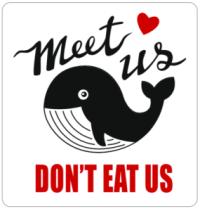 Paradoxically, whale watching by tourists to Iceland is booming. At the same time, the primary economic support for the hunting of whales by Icelandic whalers are also tourists to the island.
Paradoxically, whale watching by tourists to Iceland is booming. At the same time, the primary economic support for the hunting of whales by Icelandic whalers are also tourists to the island.
Iceland is the largest whale watching destination in Europe. Around 20% of all tourists who visit Iceland go whale watching, which is to say somewhere between 300,000 and 400,00 tourists yearly.
Along with Japan and Norway, Iceland is also one of only three countries still engaging commercial whaling. And who is eating all the whale meat? Tourists. Tourists eat about 70% of all whale meat from Icelandic whaling. Icelanders eat around 2%. The rest is exported, mostly to Japan.
So, basically, tourists support both the growth of Icelandic whale watching while at the same time providing an economic foundation for Icelandic whaling.
On a recent trip to Iceland, my wife and I enjoyed whale watching in the Westfjords and several days later were not happy to see “Peppered Minke Whale” offered as an entre in a restaurant where we stopped for lunch in the capital city of Reykavik.
IceWhale, the Icelandic Whale Watching Association, is working with the International Fund for Animal Welfare (IFAW) to help educate tourists and to get whale off restaurant menus with their “Meet Us, Don’t Eat Us” campaign.
One of the goals is to change the perception of whale eating among tourists. Whale meat is not a local delicacy as has been claimed nor is it an ancient Icelandic tradition, in any real sense. Commercial whaling didn’t start in Iceland until 1948. Prior to that most whalers in Icelandic waters were foreign ships.
IceWhale is also promoting “whale friendly” restaurants which have agreed to take whale meat off their menus.
The campaign has had considerable success. A recent survey showed that whale meat consumption by tourists is down by 50% since the beginning of the campaign not quite a decade ago.
The good news is that due to rising costs and weakening demand Iceland’s two whaling companies have decided to abandon the summer whaling season for the first time in 17 years.
